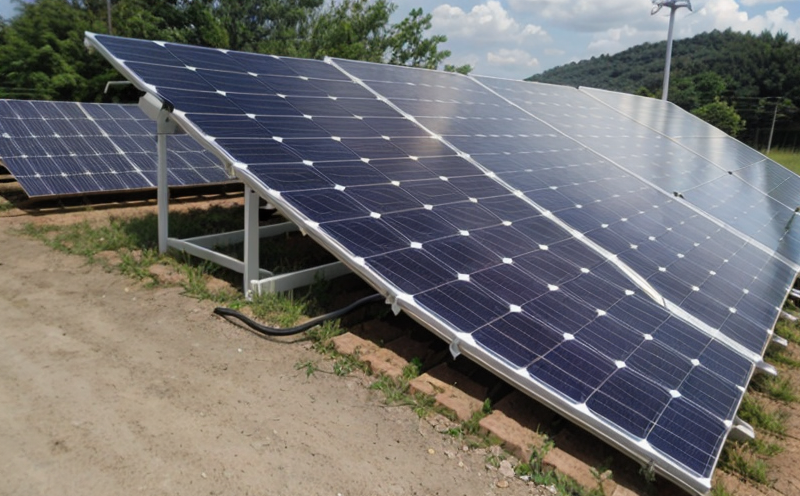IEC 61730-2 Ball Pressure Testing
The International Electrotechnical Commission (IEC) has established a series of standards for photovoltaic (PV) systems, including IEC 61730. This standard is crucial for ensuring the safety and reliability of solar panels and photovoltaic modules in both residential and industrial applications.
IEC 61730-2 focuses specifically on mechanical load testing. It outlines a series of tests to evaluate the robustness and durability of PV modules under various stress conditions, including ball pressure testing. This type of test simulates real-world conditions where external objects might accidentally collide with solar panels during installation or operation.
The purpose of IEC 61730-2 is to ensure that PV modules can withstand the impact of a 5 kg steel ball dropped from a height of 1 meter onto different parts of the module. The test aims to identify potential weaknesses in the construction, such as cracks or delaminations, which could compromise the integrity and performance of the solar panel.
The testing process involves carefully preparing the sample by cleaning it thoroughly and ensuring that any dirt or dust does not interfere with the test results. Once prepared, the module is placed on a rigid surface, and the ball is dropped from a specified height onto different areas of the module, including the glass, backsheet, and cell.
The test results are analyzed for any visible damage after each impact. If any cracks or delaminations appear, the sample fails the test. This failure indicates that the PV module does not meet the safety requirements set forth by IEC 61730-2, and further investigation into the design and manufacturing process is necessary.
It's important to note that while this test focuses on mechanical impacts, it complements other tests within IEC 61730 that evaluate electrical performance, thermal cycling, humidity conditioning, and more. Together, these comprehensive tests provide a holistic assessment of the safety and reliability of PV modules.
At Eurolab, we employ state-of-the-art equipment and highly skilled technicians to perform this critical test in accordance with IEC 61730-2 standards. Our laboratories are equipped with precision measuring instruments capable of accurately recording even the slightest changes in the module's structure following each impact.
The results from these tests are then meticulously documented, providing clear evidence of the module’s compliance or non-compliance with IEC 61730-2 standards. This documentation is invaluable for quality managers and compliance officers who need to ensure that their solar panels meet international safety requirements.
In addition to the standard test procedure, Eurolab can also customize our services to accommodate specific client needs or additional testing protocols. Whether it's a one-off test or an ongoing certification process, we offer flexible solutions tailored to your unique requirements.
Eurolab Advantages
- Comprehensive Testing Capabilities: Eurolab provides a full range of testing services for solar panels and photovoltaic modules, ensuring that every aspect of the product is thoroughly evaluated.
- Expertise in Compliance: Our team of experienced engineers and technicians ensures that all tests are conducted in strict adherence to IEC 61730-2 standards.
- State-of-the-Art Facilities: Equipped with the latest testing equipment, our laboratories offer precise and reliable test results every time.
- Customized Solutions: Eurolab works closely with clients to develop tailor-made testing programs that meet specific needs or regulatory requirements.
- Rapid Turnaround Times: We understand the importance of timely delivery, and our efficient processes ensure that your samples are tested and reported on quickly.
- Comprehensive Reporting: Detailed reports accompany every test result, providing clear insights into the performance and safety of each module.
Customer Impact and Satisfaction
By partnering with Eurolab for IEC 61730-2 ball pressure testing, our customers enjoy a range of benefits that enhance their operations and reputation.
Enhanced Product Quality: With rigorous testing protocols in place, we ensure that only the highest quality PV modules reach your clients. This not only improves customer satisfaction but also builds trust within the industry.
Increased Market Competitiveness: Compliance with international standards like IEC 61730-2 is essential for competing in global markets. By offering products that meet these stringent requirements, you can differentiate your offerings and attract more business opportunities.
Cost Efficiency: While initial testing may seem expensive, the long-term savings from avoiding costly recalls and reputational damage far outweigh these costs. Eurolab's efficient processes ensure that testing remains as cost-effective as possible without compromising on quality.
Regulatory Compliance: Ensuring compliance with international standards not only avoids penalties but also opens doors to new markets. Our services help you navigate complex regulations, ensuring smooth operations and growth potential.
Improved Safety Standards: By adhering to IEC 61730-2, we contribute to the overall safety and reliability of solar energy systems, which is crucial for both residential and industrial applications. This commitment to safety enhances your brand reputation and fosters customer loyalty.
Customer Satisfaction: Our clients appreciate our transparency and clear communication throughout the testing process. Detailed reports and timely feedback ensure that they are fully informed about every step of their product's journey through our labs.
Use Cases and Application Examples
- Residential Solar Panel Installation: Ensuring that solar panels installed in residential settings can withstand accidental impacts from objects like furniture or tools is crucial. IEC 61730-2 ball pressure testing helps verify this.
- Commercial PV Systems: For large-scale commercial installations, the robustness of the modules becomes even more critical. This test ensures that the panels can handle unexpected impacts without compromising safety or performance.
- Industrial Applications: In industrial settings where solar energy is used to power operations, ensuring that the PV modules are resilient against accidental collisions is vital for continuous operation and safety.
- Export Compliance: For companies exporting their products internationally, compliance with IEC 61730-2 ensures they meet the regulatory requirements of importing countries.
- New Product Development: During the R&D phase, this test helps identify potential weaknesses in new designs, allowing for iterative improvements before commercialization.





